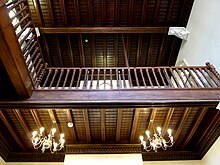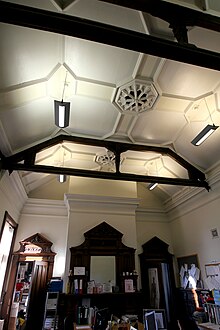
Brighouse is a town within the metropolitan borough of Calderdale, in West Yorkshire, England. Historically within the West Riding of Yorkshire, it is situated on the River Calder, 4 miles (6.4 km) east of Halifax. It is served by Junction 25 of the M62 motorway and Brighouse railway station on the Caldervale Line and Huddersfield Line. In the town centre is a mooring basin on the Calder and Hebble Navigation. The United Kingdom Census 2001 gave the Brighouse / Rastrick subdivision of the West Yorkshire Urban Area a population of 32,360. The Brighouse ward of Calderdale Council gave a population of 11,195 at the 2011 Census. Brighouse has a HD6 postcode.

Mytholmroyd is a large village and former civil parish, now in the parish of Hebden Royd, in the Calderdale district, in West Yorkshire, England, 2 miles (3 km) east of Hebden Bridge. It lies in the Upper Calder Valley, 10 miles (16 km) east of Burnley and 7 miles (11 km) west of Halifax. The village, which has a population of approximately 4,000, is in the Luddendenfoot Ward of Calderdale Council.

Sowerby Bridge is a market town in the Upper Calder Valley in Calderdale in West Yorkshire, England. The Calderdale Council ward population at the 2011 census was 11,703.
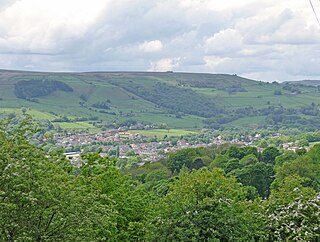
Calderdale is a metropolitan borough of West Yorkshire, England, which had a population of 211,439. It takes its name from the River Calder, and dale, a word for valley. The name Calderdale usually refers to the borough through which the upper river flows, while the actual landform is known as the Calder Valley. Several small valleys contain tributaries of the River Calder. The main towns of the borough are Brighouse, Elland, Halifax, Hebden Bridge, Sowerby Bridge and Todmorden.

Halifax Minster is the minster church of Halifax, Calderdale, West Yorkshire, England. The church is dedicated to St John the Baptist. The parish church of the town, it was granted minster status in 2009. Halifax Minster is one of three churches in the county of West Yorkshire to be given this honorific title; the other two are Dewsbury Minster and Leeds Minster.

Shibden Hall is a Grade II* listed historic house located in a public park at Shibden, West Yorkshire, England. The building has been extensively modified from its original design by generations of residents, although its Tudor half-timbered frontage remains its most recognisable feature.
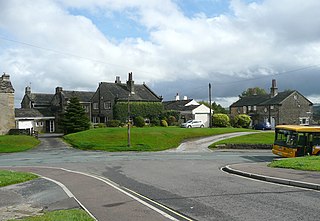
Skircoat Green is an area to the south of Halifax, West Yorkshire, England. Skircoat is a ward of the Borough of Calderdale whose population at the 2011 Census was 12,712.

Halifax is a town in the Metropolitan Borough of Calderdale, in West Yorkshire, England. It is in the eastern foothills of the Pennines. In the 15th century, the town became an economic hub of the old West Riding of Yorkshire, primarily in woollen manufacture with the large Piece Hall square later built for trading wool in the town centre. The town was a thriving mill town during the Industrial Revolution with the Dean Clough Mill buildings a surviving landmark. In 2021, it had a population of 88,109. It is also the administrative centre of the wider Calderdale Metropolitan Borough.

Halifax Town Hall is a grade II* listed, 19th century town hall in the town of Halifax, West Yorkshire, England. It is notable for its design and interiors by Charles Barry and his son, Edward Middleton Barry, and for its sculptures by John Thomas. The town hall is also the headquarters of Calderdale Metropolitan Borough Council.

Bankfield Museum is a grade II listed historic house museum, incorporating a regimental museum and textiles gallery in Boothtown, Halifax, England. It is notable for its past ownership and development by Colonel Edward Akroyd, MP, and its grand interior.

St Robert's Church, Pannal, North Yorkshire, England, also known as St Robert of Knaresborough Parish Church, is a Grade II* listed building. A 13th-century wooden church dedicated to St Michael was rebuilt in sandstone in the 14th century by monks of the Trinitarian Order from Knaresborough Priory. It was perhaps then that it was rededicated to Robert of Knaresborough. Its nave was rebuilt in the 18th century, restored in the 19th and remodelled in the 20th. Extensions were added in the 20th century. It is a parish church, and the vicar also serves the Church of St Michael and All Angels, Beckwithshaw.
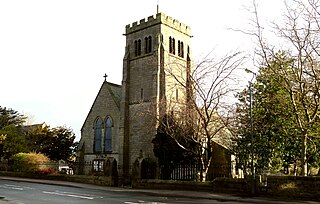
The Church of St Michael and All Angels, Beckwithshaw, North Yorkshire, England, also known as Beckwithshaw Church, is an Anglican church built and furnished between 1886 and 1887 by William Swinden Barber in the Gothic Revival style as part of the Arts and Crafts movement. The stained glass windows in the same style were added in 1892. The church is listed as a Grade II historic structure; it is a pristine and unchanged example of an Arts and Crafts church retaining all its original furnishings, apart from one missing statue. However, in 2018 the church officers gained planning permission for changes which included removing all of the original pews. The first vicar of this church, from 1887 to 1894, was Charles Farrar Forster.

William Swinden Barber FRIBA, also W. S. Barber or W. Swinden Barber, was an English Gothic Revival and Arts and Crafts architect, specialising in modest but finely furnished Anglican churches, often with crenellated bell-towers. He was based in Brighouse and Halifax in the West Riding of Yorkshire. At least 15 surviving examples of his work are Grade II listed buildings, including his 1875 design for the Victoria Cross at Akroydon, Halifax. An 1864 portrait by David Wilkie Wynfield depicts him in Romantic garb, holding a flower. He served in the Artists Rifles regiment in the 1860s alongside Wynfield and other contemporary artists.

Calderdale Metropolitan Borough Council, also known as Calderdale Council, is the local authority for the Metropolitan Borough of Calderdale in West Yorkshire, England. It is a metropolitan borough council and provides the majority of local government services in the borough. Since 2014 the council has been a constituent member of the West Yorkshire Combined Authority.

The Church of St John the Divine, designed by William Swinden Barber, was built as a mission church in 1892–1893 in the parish of St James, Chapelthorpe, Crigglestone, Wakefield, West Yorkshire, England. It is Grade II listed. It was funded by local benefactor Mary Mackie in memory of her husband. It is of Gothic Revival and Arts and Crafts design. The exterior is small, plain and simple and the interior is low church; nevertheless the interior contains a fine scissor-truss roof which retains its original 1892 stencil paintings. The church closed in 2018. In 2020 the church was purchased.The church is destined to be converted into a 4 bedroom home now plans have been approved Wakefield council in 2024.

The Church of St Thomas, Thurstonland, West Yorkshire, England, is an Anglican church. It is an Arts and Crafts building in Gothic Revival style, designed by James Mallinson and William Swinden Barber, and completed in 1870. The building was funded by William Legge, 5th Earl of Dartmouth, and it was consecrated by Robert Bickersteth, Bishop of Ripon. The total height of the tower and spire is 109 feet (33 m), and the nave contains an arch-braced hammerbeam roof.

Charles Mawer (1839–1903) was an architectural sculptor, based in Leeds, West Yorkshire, England. He was the son of sculptors Robert and Catherine Mawer and the cousin of William Ingle. He was apprenticed to his father, and worked within the partnership Mawer and Ingle alongside his cousin William and his own mother between 1860 and 1871, and then ran the stone yard himself until he formed a partnership with his fellow-apprentice Benjamin Payler in 1881. Following that date, his whereabouts and death are unknown. His last major work for Mawer and Ingle was Trent Bridge, where he carved alone, following the death of William Ingle. He is noted for his work on the rebuilding of the mediaeval Church of St Michael and All Angels, Barton-le-Street, completed in 1871, where he repaired and recreated damaged and missing Romanesque carvings, and for his carving on William Swinden Barber's 1875 Church of St Matthew, Lightcliffe. Charles' last known work ornaments another Barber church: the 1880 Church of St Thomas the Apostle, Killinghall. Charles was a member of the Mawer Group of Leeds architectural sculptors, which included those mentioned above, plus Matthew Taylor.

Brighouse Town Hall is a former municipal building in Thornton Square, Brighouse, West Yorkshire, England. The town hall, which was the headquarters of Brighouse Borough Council, is a Grade II listed building.
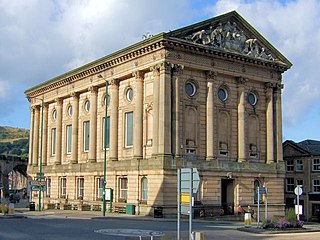
Todmorden Town Hall is a municipal building in Halifax Road, Todmorden, West Yorkshire, England. The town hall, which is the meeting place of Todmorden Town Council, is a grade I listed building.







